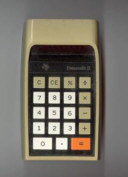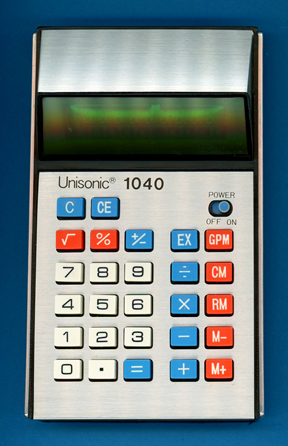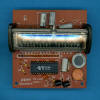
DATAMATH CALCULATOR MUSEUM
 |
DATAMATH CALCULATOR MUSEUM |
Unisonic Model 1040-1
| Date of introduction: | 1977 | Display technology: | Fluorescent |
| New price: | Display size: | 8 | |
| Size: | 5.3" x 3.2" x
1.25" 134 x 82 x 32 mm3 |
||
| Weight: | 4.7 ounces, 134 grams | Serial No: | 244809 |
| Batteries: | 4*AAA | Date of manufacture: | mth 12 year 1977 |
| AC-Adapter: | Origin of manufacture: | Taiwan | |
| Precision: | 8 | Integrated circuits: | TMS1044 (TP 7745) |
| Memories: | Displays: | Futaba 9-ST-08A | |
| Program steps: | Courtesy of: | Joerg Woerner |

![]()
 Unisonic
introduced already in 1975 its first Model 1040 but here at the Datamath
Calculator Museum we are focused on this Model 1040-1 introduced in 1977 and
manufactured by its Original Equipment Manufacturer (OEM)
Zeny Corporation in Taiwan.
Unisonic
introduced already in 1975 its first Model 1040 but here at the Datamath
Calculator Museum we are focused on this Model 1040-1 introduced in 1977 and
manufactured by its Original Equipment Manufacturer (OEM)
Zeny Corporation in Taiwan.

 Dismantling the featured 1040-1 calculator manufactured in December 1977
reveals a very cost effective design using a single-sided printed circuit board
(PCB) centered around a TMS1044 single-chip calculator circuit connected to a 9-digit
Vacuum Fluorescent Display (VFD), a keyboard assembly and powered by 4 AAA-sized
alkaline batteries.
Dismantling the featured 1040-1 calculator manufactured in December 1977
reveals a very cost effective design using a single-sided printed circuit board
(PCB) centered around a TMS1044 single-chip calculator circuit connected to a 9-digit
Vacuum Fluorescent Display (VFD), a keyboard assembly and powered by 4 AAA-sized
alkaline batteries.
![]()
 The TMS1044 is a member of the
TMS1040 Product Family based on the
TMS1070
"computer-on-a-chip" introduced in 1974 with the original
TMS1000.
While the TMS1070 can directly interface with low-voltage VFDs up to 35 Volts
does it still need external resistors and a zener diode to bias the anodes and
grids of the display with respect to the filament. The TMS1040 added an extra
VPP pin to connect a negative 30 Volts bias voltage for its modified
output drivers. With the TMS1070 featuring 11 R Outputs for the Digits, 8 O
Outputs for the Segments and 4 K Inputs for the Keyboard, reduced the TMS1040
the number of R Outputs to 9, consequently are all known TMS1040 calculator
designs using a 9-digit VF Display.
The TMS1044 is a member of the
TMS1040 Product Family based on the
TMS1070
"computer-on-a-chip" introduced in 1974 with the original
TMS1000.
While the TMS1070 can directly interface with low-voltage VFDs up to 35 Volts
does it still need external resistors and a zener diode to bias the anodes and
grids of the display with respect to the filament. The TMS1040 added an extra
VPP pin to connect a negative 30 Volts bias voltage for its modified
output drivers. With the TMS1070 featuring 11 R Outputs for the Digits, 8 O
Outputs for the Segments and 4 K Inputs for the Keyboard, reduced the TMS1040
the number of R Outputs to 9, consequently are all known TMS1040 calculator
designs using a 9-digit VF Display.

 Looking
closer onto the PCB you'll notice two diodes labeled D4 and D5 and placed
somehow between the TMS1044 and the keyboard assembly - at first glance an unusual
approach. Preparing our DCM-50A Platform
to allow the Characterization of Single-Chip Calculator Circuits
of the TMS1040 Family, we reverse-engineered the Model 1040-1 calculator and
understood that Texas Instruments started to add with the TMS1040 a "virtual"
5th Keyboard Input line by using two additional diodes emulating the 5 K Inputs
of the TMC0980 Family. While the
TMS0100 single-chip calculator circuit
introduced the concept of an 11x4 keyboard matrix scanned with the 11 Digit
Outputs and 4 Keyboard Inputs, would the reduction to just 9 Digit Outputs of
the TMS1040 allow for only 9x4 keys and switches, in some calculator
applications a possible show-stopper. Adding an extra "virtual" Keyboard Input
allows consequently for a 9x5 keyboard matrix - but the featured Unisonic Model
1040-1 sports obviously only 27 keys and an hard-wired power [on/off] switch.
The TMS1044 was used with a wide range of calculators, the Brinlock
Model 806 marked with only 23 keys
together with the Bohsei Model 1000 the
lower end, while the Privileg 858 MD
unleashed the potential of the chip with 31 keys and an additional sliding
switch and this Unisonic Model 1040-1 being the middle child.
Looking
closer onto the PCB you'll notice two diodes labeled D4 and D5 and placed
somehow between the TMS1044 and the keyboard assembly - at first glance an unusual
approach. Preparing our DCM-50A Platform
to allow the Characterization of Single-Chip Calculator Circuits
of the TMS1040 Family, we reverse-engineered the Model 1040-1 calculator and
understood that Texas Instruments started to add with the TMS1040 a "virtual"
5th Keyboard Input line by using two additional diodes emulating the 5 K Inputs
of the TMC0980 Family. While the
TMS0100 single-chip calculator circuit
introduced the concept of an 11x4 keyboard matrix scanned with the 11 Digit
Outputs and 4 Keyboard Inputs, would the reduction to just 9 Digit Outputs of
the TMS1040 allow for only 9x4 keys and switches, in some calculator
applications a possible show-stopper. Adding an extra "virtual" Keyboard Input
allows consequently for a 9x5 keyboard matrix - but the featured Unisonic Model
1040-1 sports obviously only 27 keys and an hard-wired power [on/off] switch.
The TMS1044 was used with a wide range of calculators, the Brinlock
Model 806 marked with only 23 keys
together with the Bohsei Model 1000 the
lower end, while the Privileg 858 MD
unleashed the potential of the chip with 31 keys and an additional sliding
switch and this Unisonic Model 1040-1 being the middle child.
Comparing the functionality of these calculators demonstrates the bandwidth of products made possible with the TMS1044 single-chip calculator circuit:
| Calculator | C CE |
C/CE | M+ M− |
RM CM |
R/CM | X<>M | X<>Y | +/- | 1/x | x2 | √x | % | Δ% | PI | → | ∑ |
| Brinlock Model 806 | * | * | * | * | * | |||||||||||
| Bohsei Model 1000 | * | * | * | * | * | * | * | * | ||||||||
| Unisonic Model 1040-1 | * | * | * | * | * | * | * | * | ||||||||
| Privileg 858 MD | * | * | * | * | * | * | * | * | * | * | * | * | * | * |
The Canon F-31 using with the TMS1045 another product of the TMS1040 portfolio sports 30 keys and a 4-position switch and hence making good use of the "virtual" 5th Keyboard Input line.
If you have additions to the above article please email: joerg@datamath.org.
© Joerg Woerner, November 13, 2022. No reprints without written permission.